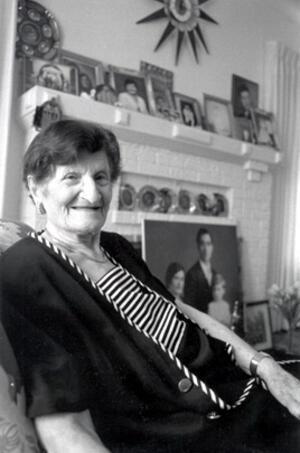Louise Azose
Born into a rabbinic Sephardic family in Bursa, Turkey, Louise Maimon followed her parents and siblings to Seattle in 1927 after her father was called to serve as a rabbi for the Sephardic Bikur Holim congregation. Married in 1929 to Jack Azoze, they raised four sons and one daughter. Long active in Seattle’s Sephardic community until she passed, at nearly 100 years old, Louise was a living treasure of the traditions, history, recipes, faith, and folksongs of the Sephardic people she loves. Louise’s conversation and memories are filled with Ladino [Judeo-Spanish] words and phrases spoken within Spanish-Sephardic Jewish cultures.
Azose discusses her family history, growing up in Bursa, Turkey, as one of eight children, and attending school in Tekirdag. She talks about her family immigrating to Seattle in 1924 when her father had an opportunity to be a rabbi there. Due to immigration quotas, Louise and her sister couldn’t join the rest of the family until 1927. They stayed in Istanbul and later Vancouver. Azose describes this as a challenging time for her and her sister. She talks about life in the United States, meeting her husband Jack, starting her family, and the rewards of being involved in her synagogue. Azose describes, in detail, the traditional Sephardic foods she cooked for her family and the community on holidays and the various religious and cultural customs and that she and her family practiced on holy days and special occasions.
In her second interview, Louise Azose reflects on the joys of raising a family, the pain of losing her parents, and what it was like having three sons serving in World War II at the same time. She talks about the role of singing in her family and the songs they would sing together at home and synagogue. Azose describes her children, how their lives unfolded, and the careers they ended up pursuing. Finally, Louise reflects on her life and memories, particularly her travels around the world with her husband Jack before his illness and death in 1987. After he passed, Louise continued to volunteer and stay involved in the community. Louise sings throughout the interview, sharing passion and heritage through traditional songs.



